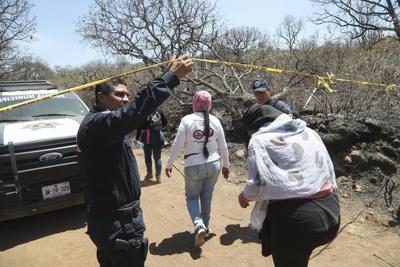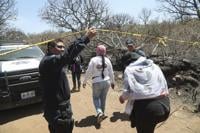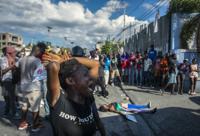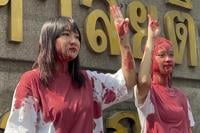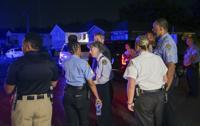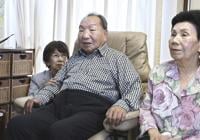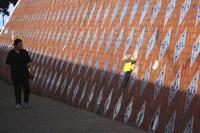MEXICO CITY (AP) — A drug cartel bomb attack that allegedly used a fake report of a mass grave to lure police into a deadly trap has had devastating collateral damage: It has led some authorities to abandon the volunteers who search for Mexico’s 110,000 missing people.
Most of the searchers are distraught mothers looking for the bodies of the thousands of victims of kidnapping gangs and drug cartels, who dump their bodies in clandestine graves.
A day after Tuesday’s attack that killed four police officers and two civilians in Jalisco state, Gov. Enrique Alfaro announced that he was temporarily suspending police involvement in such searches as a safety measure, drawing consternation from the volunteer groups, who are known as “collectives.”
Alfaro said an anonymous caller had given a volunteer searcher a tip about a supposed clandestine burial site near a roadway in Tlajomulco, Jalisco. The cartel buried improvised explosive devices, or IEDs, on the road and then detonated them as a police convoy passed. The IEDS were so powerful they destroyed four vehicles, injured 14 people and lefts craters in the road.
It was the latest indignity suffered by mothers who, faced with government inaction and years of uncertainty over what happened to their loved ones, have taken on themselves the grisly task of looking for their remains.
It is dangerous and grueling work. Six volunteer search activists have been killed in Mexico since 2021. The searchers face extreme heat, rough terrain and grisly work as they walk through suspected clandestine burial sites, plunging steel rods into the earth to detect the scent of decaying bodies below.
Alfaro's announcement outraged the volunteer groups; Jalisco state has the highest number of disappeared in the country, and searchers there already distrusted authorities because they failed to investigate quickly when their children disappeared, and left subsequent investigative work to the victims’ families.
“This is just another sign of a government that is out of its depth,” said Hector Flores, who leads the Light and Hope search group in Jalisco. “Not only can’t they find the disappeared, they can’t even provide security.”
Flores’ frustration is enormous: May 18 was the second anniversary of the disappearance of his son, Hector Daniel Flores Fernández, in Guadalajara in 2021. No trace of him has been found.
Now searchers like him will lose the little police support they had: convoys of forensic examiners that go out and exhume the bodies searchers locate, a necessary step in getting forensic tests to identify the remains.
“This is a step backward. The anonymous calls were the way we found many of the remains,” Flores said.
The bomb plot illustrated the increasingly serious, military-style threat Mexico’s drug cartels pose to the government. President Andrés Manuel López Obrador said Thursday the cartels have started to use bombs, IEDs and explosives “constantly,” and that seizures of explosives are frequent in the region.
But it also exposed the tenuous nature of an unspoken agreement with the cartels under which the searchers have more or less been allowed to do their work for years.
It is not entirely clear who killed the six searchers slain since 2021. Cartels have tried to intimidate searchers in the past, especially if they went to graves sites that were still being used.
Searchers have long sought to avoid the cartels’ wrath by publicly pledging that they are not looking for evidence to bring the killers to justice, that they simply want their children’s bodies back.
Searchers also say that repentant or former members of the gangs are probably the most effective source of information they have.
Ceci Flores, the leader of a search group in the northern border state of Sonora, made headlines last month when she publicly appealed to the cartels for a truce, in which they would agree not to interfere with the searchers. She said several gangs had responded.
“In some states they (gang leaders) have responded, saying to us there was no problem, that we could keep searching for the disappeared,” Flores said, noting they had said “perhaps some day we would have to be searching for them, too.”
The truce idea was not born of naivete, but of desperation, in a country with over 110,000 disappeared and woefully indolent or over-worked police and forensics examiners.
“We have begged them not to keep disappearing people, but they continue to do so,” said Flores, who is not related to Hector.
Ceci Flores said the governor’s decision to stop police cooperation in the searches would not stop mothers like her. One of her sons, Alejandro Guadalupe, disappeared in 2015. Her second son, Marco Antonio, was abducted in 2019. Authorities have told her nothing about the fate of either of them.
“He (the governor) can stop his police, but he cannot order the mothers around, because he has never helped them,” Flores said. “If he can’t help, he can get out of the way.”
Some search groups cast doubt on the governor’s story about the roadside bomb attack Tuesday night, in which seven buried improvised explosives devices were detonated, apparently by remote control.
Another group, the Searching Mothers of Jalisco, said in a statement that “we never received such a phone call, and we never go out to do field work at night, it’s illogical.”
“If you think we are in danger, Enrique Alfaro RamĂrez, then give us the protection we deserve for having done your job!” the statement read.
Hector Flores said that the cartel bombs were a message directed at the government, not the volunteer searchers.
“We believe this was the cartels breaking with the government, rather than any attack against the searchers,” Flores said.

